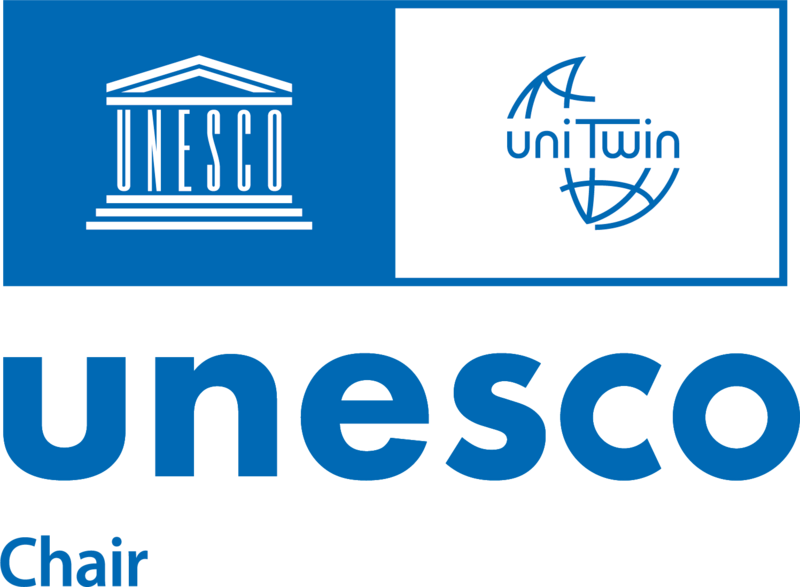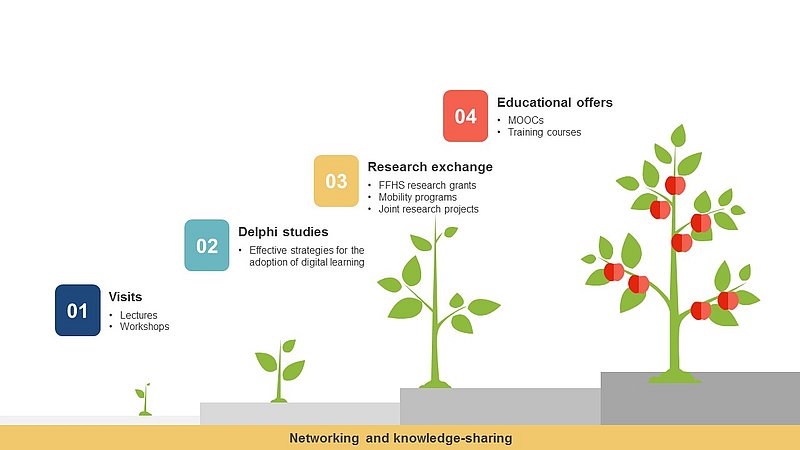UNESCO Chair on Personalised and Adaptive Distance Education (UNESCO Chair PADE)
Since 2016, the Swiss Distance University of Applied Sciences (FFHS) holds the UNESCO Chair on Personalised and Adaptive Distance Education (UNESCO Chair PADE). The UNESCO Chair operates as an international networking platform for the research, development and implementation of innovative learning concepts in the area of personalised and adaptive distance education. It also serves as a bridge builder in the sharing of knowledge between the researchers and academic staff at the regional, national and global levels.
The mission of the UNESCO Chair at the FFHS is to perform extensive research and teaching in the area of personalised and adaptive distance education through joint research projects and national and international cooperation. All activities focus on exploring and developing innovative solutions that support the individual needs of learners during their learning process, as well as supporting educational staff in exploiting the potential of adaptive learning concepts and systems.
Research areas:
- Personalised and adaptive instructional models and systems
- Innovative measurement of learning variables («learning analytics») to adapt teaching, content or recommendations to the individual needs of learners, particularly with the help of artificial intelligence techniques
- Implementation of adaptive tools or environment
By doing so, the UNESCO Chair is committed to contributing to the implementation of the new Agenda for Sustainable Development 2030 adopted by the United Nations (UN) members in 2015 in the area of education. Education is mainly addressed in Sustainable Development Goal 4 (SDG 4), which aims to «ensure inclusive and equitable quality education and promote lifelong learning opportunities for all».
UNESCO Chair Activities
The UNESCO Chair activities focus on international networking, fostering multidisciplinary research and developing educational offers in collaboration with partners from Europe and Africa. The typical procedure of the Chair is shown in Figure 1. The procedure includes short on-site visits, exploratory Delphi studies, research exchange (e.g., grants and joint research projects) and the development of educational offers (e.g., MOOCs).
Triggering Research
Exchange programme for researchers
An exchange programme for researchers has been launched to promote international fellowships, networking and research competence. It involves short stays at partner institutions by FFHS employees to identify situation-specific research requirements, half-year research stays by exchange researchers at the FFHS to conduct laboratory experiments and one-and-a-half-year field studies at partner institutions to put experimental findings to the test and create practical applications.
The research results are used to develop educational offers. All activities are documented in the form of websites, publications, workshops and guides to make them available to the public as an open resource. By doing so, the UNESCO Chair contributes to establishing and developing awareness and competencies for personalised and adaptive learning concepts and systems on a national and an international level.
Grants for researchers
The Chair organises fellowships to promote cooperation between Chair staff and young, talented researchers worldwide. In the first phase, we focused on cooperation with the African continent. Currently, we are broadening the focus and establishing collaboration on other continents, as well as on an individual level.
The following examples show possibilities for cooperation.
- The Open University of Tanzania (OUT):
With a two-year grant (2020-2021), a fellow from the OUT has conducted a Delphi study on the «Future of technology-based learning at OUT» in cooperation with a research team of the UNESCO Chair PADE. The study aims at developing the guidelines for university leaders on the implementation of technology-based learning at the institution and exploring the potential of adaptive learning. https://www.out.ac.tz/ - The North-West University of South Africa (NWU):
In the framework of the partnership between the FFHS and the NWU of South Africa, an exchange programme for researchers has been established to promote international networking and research competence. In 2018, this included three FFHS grants for NWU researchers for short research stays (4 months). The aim is to identify situation-specific research requirements, support the execution of laboratory experiments and prepare a field test at the NWU. www.nwu.ac.za/
Exchange in on-site visits
Short on-site visits serve the exchange of knowledge and intend to initiate longer collaboration. The following examples show possibilities for such research exchange.
- Research exchange for October 2022: Dr. Egon Werlen will do a research exchange at the Hochschule der Medien (HdM) in Stuttgart. He will meet Dr. Yvonne Kammerer, Professor of Information and Communication Psychology, working in information design and other teams of the HdM. This research exchange is part of the Movetia mobility programme.
- In January-February 2020, Prof. Dr. Cengiz Acartürk from the Middle East Technical University of Ankara stayed on a university campus in Brig for giving various lectures and webinars on the role of emotions in learning and teaching, as well as for organising workshops on eye-tracking methods. This research exchange was part of the Movetia mobility programme.
Delphi studies
To develop joint collaboration and effective strategies for the implementation of technology-based, personalised and adaptive learning, we conduct Delphi studies in different organisations. The results of these studies provide the basis for supporting strategic decisions.
Teaching and Training
For the purposes of teaching and knowledge transfer, we organise short stays (2-14 days) at our partner universities abroad, giving lectures and conducting workshops on the topic of technology-based, personalised and adaptive learning. Together with these network partners, we develop and implement various education offers (e.g., MOOCs) at the international level.
Explore our current MOOCs on https://ffhs-mooc.ch/
UNITWIN Programme of UNESCO
Within the UNITWIN programme (University Twinning and Networking) of UNESCO, so-called UNESCO chairs have been recognised since 1992. The aim of these chairs is to promote international and inter-university cooperation and to establish networks for the exchange of knowledge and cooperation in disciplines close to UNESCO, such as education, natural and social sciences and communication.
An important instrument of the UNITWIN programme is the UNESCO chairs, which are responsible for carrying out corresponding research and knowledge transfer activities. The UNESCO chairs act as think tanks and bridge builders between academia, civil society, local communities, research and politics. The programme aims above all to promote capacity building at universities and research institutions through knowledge exchange and international solidarity in a North-South and/or South-South direction, thus supporting excellence and innovation in all regions of the world.
Further information:
International
Switzerland

Research Agreements
- Research agreement with the Leibniz-Institut für Wissensmedien (IWM) and the Welten Institute of the Open University of the Netherlands
- Research activities are conducted in the framework of the COST Action E-READ, joint research agreement, 07.11.2017 (PDF)
- Memorandum of understanding with the North-West University (NWU) of South Africa
- Memorandum of understanding, 14.02.2019 (PDF)
- Partners: Schweizerische UNESCO Kommission

